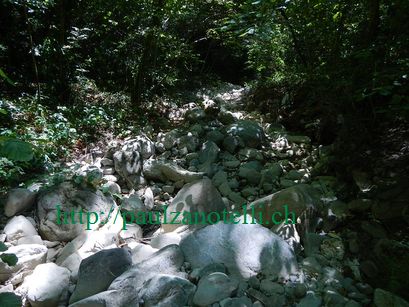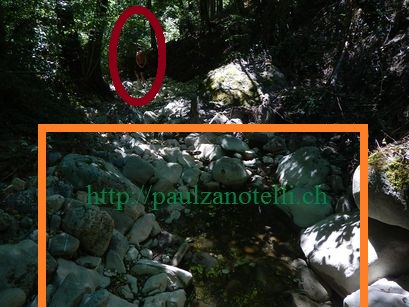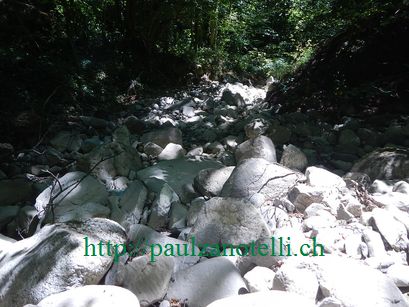Stream dried up
The
purpose of this post is therapeutic as I am trying to get rid of a vision
of horror I was inflicted during my recent break from my daily routine.
Two weeks ago on this very day, I went to my parents’ place in France,
which lies at the bottom of a village if not of Celtic origin, at least
several hundred years old, not that far from Geneva (some thirty minutes
by car, much longer by bicycle).
My parents were glad to see me as I had somewhat neglected my filial
obligations in that I had not visited them since 18th May. We were still
experiencing our third major heatwave (with a peak reading of 39.7 degrees
Celsius in Geneva on 7th July) and it was really hot on that day, so it
was a little reluctantly that I agreed to follow my father down to the
bottom part of the garden to see the stream that normally flows there, as
both he and my mother had claimed that it was all dried up.

I have to admit that, deep in me, I thought that they were exaggerating
because I could still recall the buckets and buckets of water I had drawn
out of this very same stream not even two months earlier so as to be able
to water the shrubs and other small trees my mother and I had
transplanted. The stream was far from shallow at the time and I had been
careful not to slip and find myself nose or hands in the water. This is
why I was expecting to see at least a trickle of water flowing when I
followed my father down to the bottom part of the garden.

So you can imagine my state of shock once I reached the stream and I saw
no water, neither upstream nor downstream. What a scene of desolation: an
important part of the local ecosystem which I had seen full of life,
almost brimming, only a couple of weeks earlier was no longer there. I
could neither see nor hear any sign of water. Neither could I see any dead
fish, only loose bits of plastic or other fragments of objects scattered
here and there on the pebbles and rocks which seemed like dead bones
reflecting the sun's full intensity on this very hot day (35 degrees
Celsius).

Even though I managed to see a puddle of water some eight metres further
upstream, the sight of the stream's bed dried up as far as one's vision
extended in either direction was highly disturbing. My father seemed
particularly affected: I saw him walk over almost the full stretch of the
stream belonging to them as if he were trying to survey the extent of the
damage. The slump of his shoulders was more accentuated than usual, as he
was walking with his hands behind his back. It was sad to see him walk in
such a way. He then moved back towards me and told me that he wondered
about the lack of dead fish, but then concluded that the fish would have
been eaten by predators.

I can remember saying to myself ‘If it is like this here, what must it
be in those very hot places on other continents. If this is indeed
caused by us, what is it going to be like in 40 years in countries where
there is already not enough water now.’ The mere thought of the
plight of these poor people was enough to make me feel very, very sorry
for them. As I made my way back to my parents' house, a song I had heard
for the first time during a humanitarian rock concert when I was in
England in the summer of 1985 (LiveAid)
kept ringing in my head:
Is
this the world we created
we
made it on our own
Is
this the world we devastated
Right
to the bone?
If
there's a God up in the sky looking down
What
must He think of what we've done
To
the world that He created
Queen
(an English rock band), ‘Is
This the World We Created...?’
Links
Lausanne,
11th August 2015